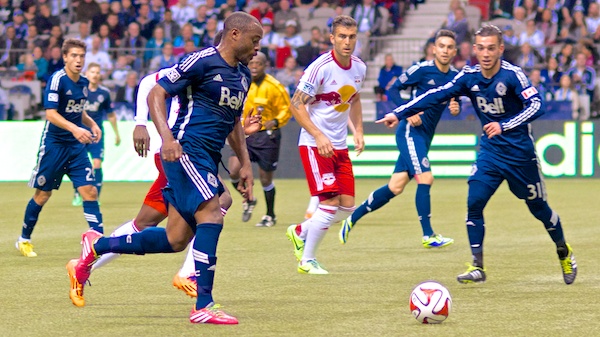As many of you know, I’m a member of the Vancouver Southsiders’ Board of Directors. As Director of External Communications, I’m responsible for responding to media requests we receive. Last week, I got an email from a young, aspiring journalist who was looking for a supporter’s perspective on the current state of the league. 
How much has the MLS changed since you began following the league, and how do you see it progressing from here?
I didn’t follow the league until the Whitecaps joined in 2011, so I wouldn’t say it’s changed that much. The designated player rule, which allows teams to bring in up to three players whose salary exceeds the league maximum, was already in place, and it’s only been tweaked since I started watching. One significant is you’re starting to see the age of higher-profile imports start to drop. MLS, ever since Beckham came over, had acquired a reputation as a retirement league. In the last couple of years, players are starting to come over in their primes. Witness Nigel Reo-Coker and Pedro Morales, for local examples, or Michael Bradley for TFC. Even Jermaine Defoe, though he’s the wrong side of 30, should have many productive years left to him. I think the logical next step for MLS, now that it’s beginning to attract quality players in their prime, is to increase compensation at the bottom of the ladder. Currently, the minimum salary for MLS players is around $35,000. Not only that, but it seems to be almost a requirement that your younger players accept that wage in order to fit into the convoluted roster rules. This has made it hard for some teams to retain talent. The Whitecaps have reportedly lost a couple of homegrown prospects to Europe because they felt they were worth more than the league minimum.

How much of a part have the fans played in the increase of quality/attention in the MLS?
The fans have been huge. MLS is not yet a television league. The Premier League ratings dwarf those of MLS, and every year brings new examples of important MLS fixtures, even playoff games and the MLS Cup Final, being absolutely slaughtered by the NCAA’s Christie’s Double-Stuff Oreo Bowl or the latest episode of Honey Boo Boo. That said, the league is still seeing growth in attendance numbers, and that’s where the fans come in. MLS is the 9th-best attended league in the world, despite being nowhere close to the big boys in terms of quality of play. The reason is simple: most of the stadiums in MLS have good to excellent atmospheres. Walk into any stadium in Cascadia (hell, any stadium on the west coast unless Chivas is playing) and you’ll find an experience comparable to decent clubs throughout Europe.
The MLS operates on a very different system than many other football leagues (draft system, salary cap, etc.). Has this hindered or helped its development?
It’s not an either-or question, really. The structure has both hindered and helped the league. MLS, in no small part because of its salary cap, will soon become the longest-running top-tier soccer league in the United States or Canada, with no signs of it slowing down any time soon. (It may have already passed the NASL, in fact. I can’t recall.) What the league has gained in stability, however, it has probably lost in credibility due to a complicated and ever-changing rule book, the full contents of which are never made available to the general public. I’m a believer in the salary cap. I think it’s the only way to ensure the league doesn’t degenerate into an oligarchy where only a few rich clubs have any hope of winning the title. The league needs to be more transparent, though, and it also needs to simplify its rule book.
You work in an organization that is obviously very close to the fans (in your case, of the Vancouver Whitecaps). How well has the MLS done to build a fan-base for its MLS teams, considering these fan bases weren’t nearly as big when the league started?
If you mean the league as a whole, I would say it’s done little to nothing to build the fan base. They’re certainly happy to advertise using the most passionate supporters to build their brand, but they do nothing to directly contribute. At the club level, it varies from atrocious to excellent. New England recently started kicking people out of the stadium with no advance communication for participating in a long-standing chant that had the word “asshole” in it. At the other end of the spectrum, Kansas City, Portland and Seattle all go out of their way to ensure an excellent and intimidating atmosphere.
What do the MLS and its subsidiaries need to do in order to keep the league progressing both in terms of footballing quality and popularity?
This is going to be my least interesting answer of the bunch, I suspect. They need to keep on as they are. I would like to see both the salary cap and the minimum salary get a significant bump in the next CBA, which is being negotiated at the end of this season, and then I would like them to return to steady growth. As the quality of players increases (and I see no reason it won’t) and the league pushes into more markets, TV revenues should increase, and then you have a snowball effect.

